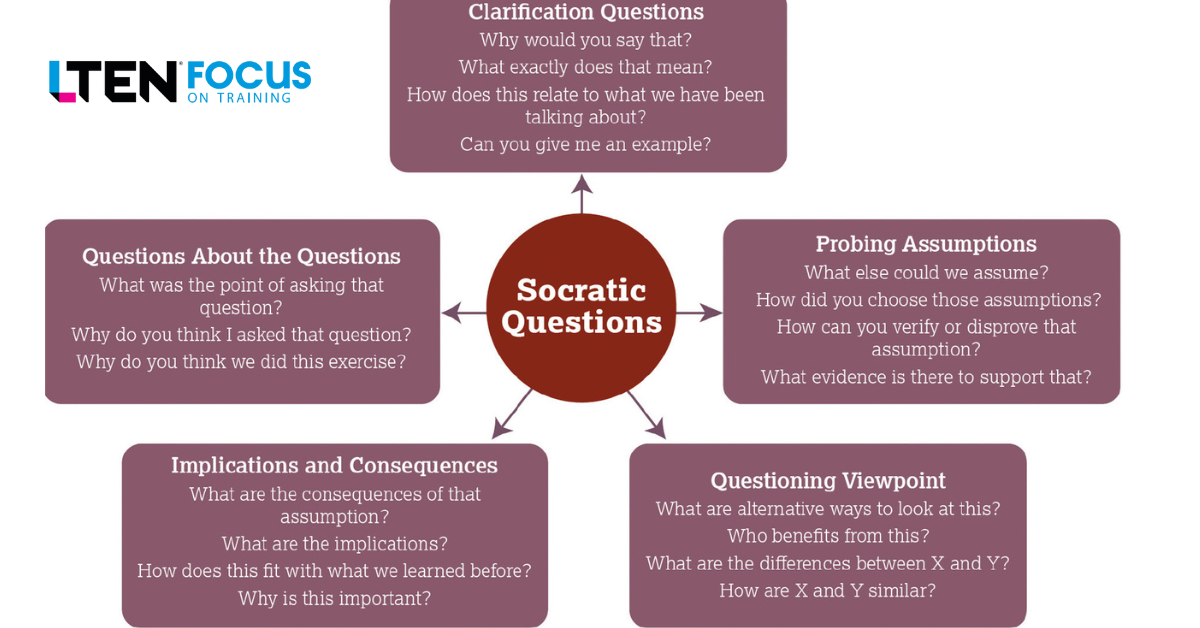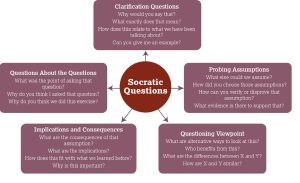
Instructional Design – By Lori Salamida
I cannot teach. I can only make people think. – Socrates
Have you ever used the Socratic method when instructing or training others? Have you ever asked learners thought-provoking, open-ended questions during or after a training session, or when debriefing an exercise, allowing for a lively debate? If so, you have used the ancient form of discourse called “Socratic dialogue.”
Socrates, the Greek philosopher, was not precisely a teacher. He professed to seek answers to urgent human questions and found that the best way to nurture intelligence in his disciples was not by telling them things (called didactic instruction) but by asking them things. That encourages dialogue, stimulates critical thinking and engages them in public conversation to draw out underlying presumptions and preconceptions.
What Is the Socratic Method?
The Socratic method is about asking questions that dig deeper into a topic and that inspire a higher level of thinking and sharing, to reach learning outcomes that wouldn’t be possible with didactic training methods alone. The Socratic method encourages dialogue, stimulates critical thinking and draws out underlying presumptions.
The Socratic method can be used to get learners to open up and share more. When you ask learners to explain things to you, they often reveal surprising mental models, problem-solving strategies, hopes, fears and much more. Discovering what the learner is feeling about the subject matter leads to a connection between learner and content, which enables greater retention.
Why Use the Socratic Method?
Asking the right questions is one of our most important roles as trainers. It can balance didactic training by encouraging learners to think critically, share their ideas and come to their own conclusions. Good questions enable learners to search for and share the knowledge and insights that they already have (or that they are gaining throughout the training process).
The inability to ask good questions, listen to the answers, then ask more good questions can greatly limit learning outcomes and can cause learners to miss the point of an exercise or even miss the point of the training. Supporting learners to find their own answers and facilitating the sharing of knowledge and experience between learners can only be accomplished by asking the right questions.
How Can We Apply It to Life Sciences?
In addition to using Socratic questioning when debriefing an exercise or facilitating a group discussion, the Socratic method can help determine if learners can recall facts, as well as assess their ability to comprehend, apply and analyze content. It can also help trainers address and correct misunderstandings or assumptions.
As the questions become more complex and align with the higher levels of Benjamin Bloom’s pyramid, learners are challenged to think beyond basic understanding toward active application of new knowledge and skills.
On a broader scale, Socratic questioning could be used in any peer-to-peer dialogue, such as internal workshops and training, and with healthcare providers as well.
In a 2022 Springer Healthcare survey of 446 providers over three separate society conferences, in addition to expressing a desire for more simplified, unbiased content, providers wanted the ability to interact with peers, ask questions and take quizzes to assess their own level of understanding.
Conclusion
Socrates had questions about everything, from the practicalities of everyday life to the existential nature of the human mind. As he guided and mentored his own students, he encouraged questions and discussion. He felt that learners could only obtain knowledge if they genuinely wanted to seek it for themselves.
Engagement is one of the most effective tools for teaching and reinforcing. Questioning for greater understanding helps the learner to connect more to the subject and the content and can be applied throughout an organization’s teaching/training model to include sales training, but also healthcare provider education.
The ultimate goal of Socratic instruction is to help all learners connect existing knowledge to new knowledge, or reaffirm a baseline level of knowledge, leaving them more engaged in self-directed learning and more excited about becoming lifelong learners.
 Lori Salamida is an instructional designer for Springer Healthcare Training US. Email Lori at Lori.salamida@springer.com.
Lori Salamida is an instructional designer for Springer Healthcare Training US. Email Lori at Lori.salamida@springer.com.









